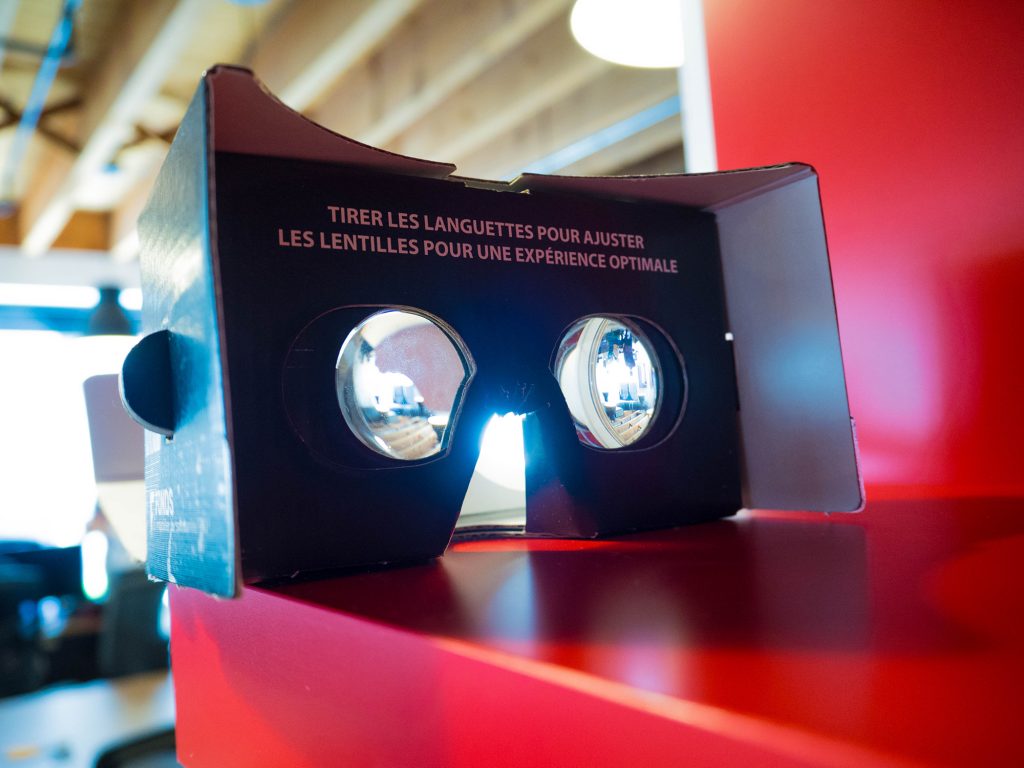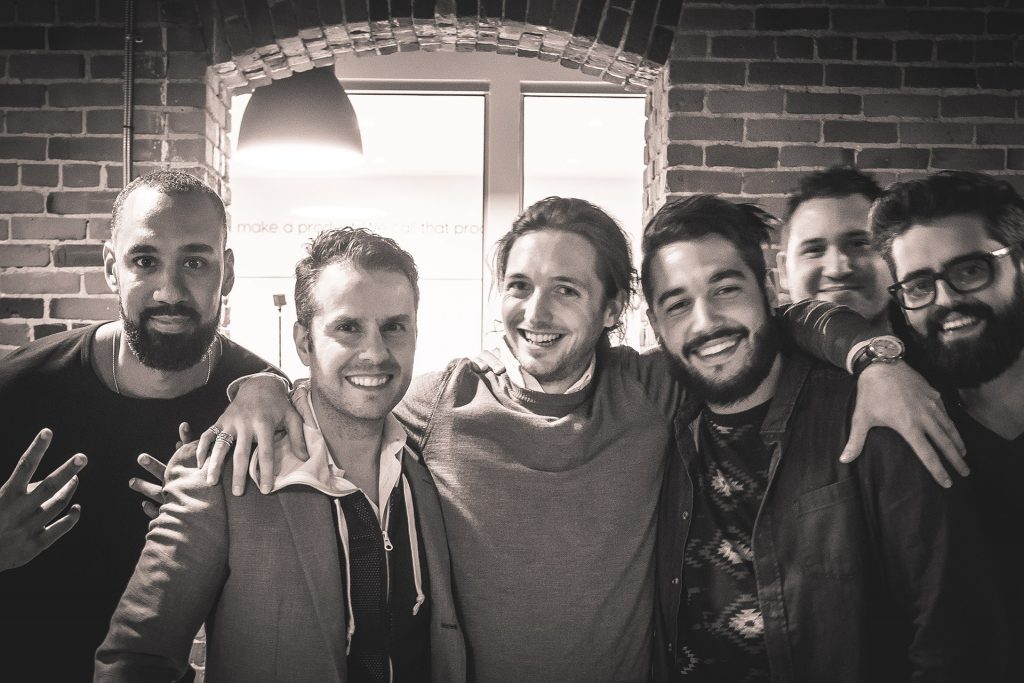If you asked 5th Wall founder Ricardo Poupada what he’d be doing with his life as early as last winter, he might have said he was going into FinTech. The industry was booming and his entrepreneurial senses saw opportunities, but ultimately he chose not to enter the space due to regulation. Instead, he’s built a thriving virtual reality (VR) innovation agency that is looking to ride the tide of VR expansion and take the world by storm — recently, the startup teamed up with Universal Pictures to build a Fifty Shades Darker masquerade ball experience.
Poupada founded AskMen.com in 1999 at the height of the tech bubble, sold it in 2005 to Fox Interactive, and spent many years travelling the globe as an angel investor, influencer in the media space, and corporate executive.
Now, he’s founded another successful startup with global ambitions. It all sounds like a classic Silicon Valley success story until you realize that he’s accomplished all this while calling Montreal — not San Francisco — home.
A narrative that is becoming more common, Poupada is one of many entrepreneurs who are making the choice to call Canada home even as the Valley tempts them with the allure of big money, fast success, and immense growth talent.
For him, it’s the place to be if you want to build a VR company.
Internet to VR: I am your grandfather
The ‘tipping point’ for Poupada getting into VR came during the Samsung Gear VR experience in Montreal in spring 2016, after being reintroduced to VR while on a business trip in Toronto a few months before. After first seeing a very nascent VR experience in London, England in 2012, Poupada realized that VR was tracking to a near identical creation and adoption curve to the internet during the 1990s.

The core difference was that more technology companies existed this time around, meaning there was more initial hype and attention paid to VR than the internet. This, says Poupada, helped but did not solve the problem. Even with global tech giants like Microsoft and Facebook making public bets on VR, many still saw it as a fad.
Current VR uses
Right now, VR has limited use cases due to quality of the technology, cost, and public interest in VR. This has not stopped 5th Wall and the broader VR community from finding their niche audience, with core early adopters in this space anchoring in gaming/entertainment, media, and real estate.
These industries not only seek ‘wow factors’ when trying to build or market their products, but have people with investment money to put into experimental technologies in order to gain a competitive advantage.
There is a talent shortage in Canada when it comes to the niche skills required in VR.
Take real estate for example, a perfect showcase of how VR can transform how we engage the world. In the city of Laval, Quebec, there is a lot of urban development. Right now, you are likely to see posters with beautiful renderings put up around the city, and perhaps even an online virtual tour of the completed areas of town.
But VR can take it one step further; Poupada’s agency is already working on this with a client.
When you put on a VR headset, you can ‘walk through’ the town from anywhere in the world. Imagine being able to walk through an empty parking lot but see new buildings, the inside of your soon-to-be favourite café, and maybe even tour your new condo.
VR can, and already is, doing this in Canada.
Building an audience
Poupada notes that other industries are keen early adopters of the technology but, whether through added scrutiny on either quality or public interest, have to hold off.
There exists the potential for VR to guide surgeons during operation, for instance, but current quality does not allow the precision that would make VR worthwhile – or safe – for mass use in the healthcare industry.
Corporate meetings also have the potential to be revolutionized by VR. If you’ve seen the movie Kingsman: The Secret Service, then you already know what I’m talking about: everyone sits down at a table in their own home, wherever they are in the world, and puts on a sleek pair of glasses. Suddenly, through virtual reality, you can see your entire team and talk to them as if they were sitting around the table from you.

Travel also has similar potential. You can tour the Great Pyramid at Giza after breakfast, the Parthenon post-lunch, and have a glass of wine overlooking the Eiffel Tower in the evening – all without leaving your hometown.
The potential use cases are nearly endless, believes Poupada, once the technology becomes more democratized in the sense that high quality VR becomes affordable to the masses.
VR vs. AR
“A person that is not a ‘VR person’ today will only be convinced if there are extremely specific use cases that apply to them,” Poupada said.
This is where the real estate industry can become a great catalyst for VR, as a vast majority of people will view real estate at some point in their lives. Even with near unlimited use cases of VR, Poupada thinks that AR will actually be the revolutionary technology that will take over our world.
“There is no doubt that all the innovations of VR will one day be transplanted into AR, because people will want to live in the real world.”
While VR transports you to a different world in a vacuum environment, AR has the ability to shift how you interact with the space you live in. As the world saw with the immense popularity of AR smartphone game Pokémon Go, bringing the innovations of VR into the AR space has the power to create a global frenzy of excitement.
Another example is credit cards, each with multiple varying benefits that most consumers don’t know about. With the right AR app, you can hold your smartphone over your credit card and it can instantly tell you what benefits you have and how to use them.
VR, AR, and the media
VR and AR also causes a tipping point for the media, says Poupada. He does not believe that VR and AR will take over media and the written word, per se, but instead deepen our interaction with it.

“How do you take the written word and augment it when people want to have different experiences?” he notes as the guiding question for media companies in a VR world.
Right now, video and the written word are the dominant forms of media consumption, but VR has the potential to transport the audience into the story. Soon, instead of just reading about a war zone or government announcement, you will be able to put on a VR headset and experience what is going on as if you were there.
With VR, you are not just interacting directly with someone in a different world — like you would if you talked to actors who broke the ‘fourth wall’ to interact with the audience — you are breaking the ‘fifth wall’ of physical space and are actually transported inside the world of the story you are learning about.
Building in Canada
“First and foremost, the thing we neglect [about Canada as a startup hub] is that Canada naturally has a much more global perspective than the US [by having a smaller market],” he noted, adding that the costs to operate are lower in Canada.
“Both Toronto and Montreal have such an international flavour. If only because Canada has both English and French, you become hyper-aware of other cultures,” he adds.

Combine those two factors – an international business mind and more cultural diversity embedded in our national identity – and Canada’s competitive advantage becomes a more global outlook. This is crucial for technology like VR and AR, which require many specific use cases to truly globally proliferate.
Poupada says many founders also ignore a big negative of working in San Francisco or New York City: ‘Shiny new thing syndrome’.
“When I started, part of our success is that we could focus on our job. There was no doubt that moving to NYC would have had positives, but the distraction of being in a city with [a huge new startup getting funded] everyday is a problem,” he added, adding that employee turnover is another negative that is lessened in Toronto or Montreal.
Canada supporting VR
Poupada also had some policy suggestions for how the Canadian government can support VR and AR.
First, the government should promote Canada as a country with active VR ecosystems. Our main startup hubs – Toronto, Kitchener-Waterloo, Montreal, and Vancouver – are all gaining traction globally for startups, but are not known to be VR and AR hubs. An ad campaign, for instance, can show founders around the world, and inspire local founders, to come (or stay) in Canada with their VR innovations.
“We need promotion to bring in founders, talent, and capital, but then the gov’t will have to get out of the way.”
Second, there is a talent shortage in Canada when it comes to the niche skills required in VR and AR, an all too common challenge for young startup communities. So while streamlining education to grow local talent and promoting startup-specific visa programs is helpful, governments can also offer subsidies to companies for supporting that talent, making it easier for small companies to innovate with bright local minds.
Finally, the government should get out of the way and let entrepreneurs build their businesses once these programs show success.
Poupada sees the need for government to help ramp up the VR/AR industry in Canada, but worries that too much government intervention could have an adverse effect and end up stifling future innovation. The industry needs initial promotion, but also the opportunity to grow organically and head towards whichever use cases are the best next steps.
Too much government advertising of VR and AR beyond the early stages might cause pressure to fulfill a certain type of use case over another, which could harm the commercialization process. Programs that aim to help individual companies get off the ground, however — such as subsidy programs or “dog-fooding,” a policy where government bodies set aside budget dedicated to Canadian goods/services, assuming all else is equal — should remain.
“We need promotion and advertising support today to bring in founders, talent, and capital, but then the government will have to get out of the way.”
Image via AskMen


